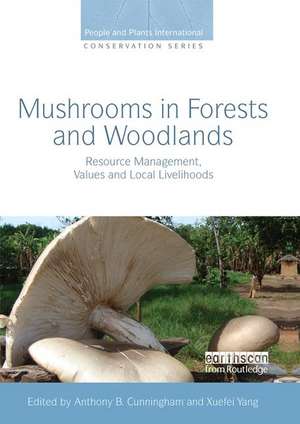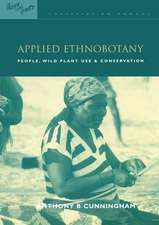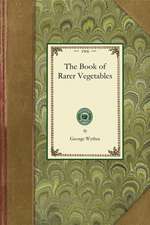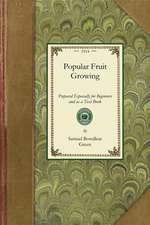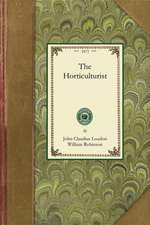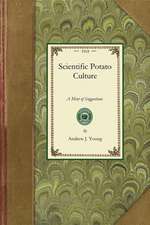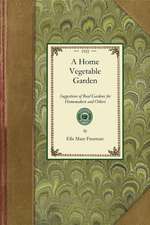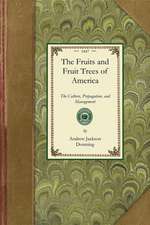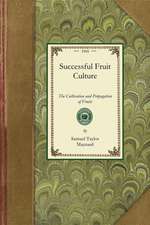Mushrooms in Forests and Woodlands: Resource Management, Values and Local Livelihoods: People and Plants International Conservation
Editat de Anthony B. Cunningham, Xuefei Yangen Limba Engleză Paperback – 21 ian 2016
| Toate formatele și edițiile | Preț | Express |
|---|---|---|
| Paperback (1) | 299.52 lei 6-8 săpt. | |
| Taylor & Francis – 21 ian 2016 | 299.52 lei 6-8 săpt. | |
| Hardback (1) | 768.30 lei 6-8 săpt. | |
| Taylor & Francis – 24 noi 2010 | 768.30 lei 6-8 săpt. |
Preț: 299.52 lei
Preț vechi: 341.57 lei
-12% Nou
57.31€ • 59.84$ • 47.33£
Carte tipărită la comandă
Livrare economică 15-29 aprilie
Specificații
ISBN-10: 113897658X
Pagini: 236
Dimensiuni: 174 x 246 x 22 mm
Greutate: 0.45 kg
Ediția:1
Editura: Taylor & Francis
Colecția Routledge
Seria People and Plants International Conservation
Locul publicării:Oxford, United Kingdom
Cuprins
Notă biografică
Recenzii
'Fungi play critical roles in the health and sustainability of forests, and the collection of fruiting-bodies (e.g. mushrooms and truffles) of many fungus species provides an important source of income for diverse peoples around the world. This book provides a comprehensive understanding of the ecology and ecosystem importance of forest fungi and how they are valued by society, particularly the income produced from the commercial collection of wild mushrooms. Most importantly, the multidisciplinary array of authors provide practical insights into conservation strategies to protect and sustain this valuable natural resource that include diverse monitoring approaches, and use of traditional knowledge and citizen participation. This book will be a valuable reference for conservation biologists and natural resource managers world-wide on how to integrate the fungal kingdom, including its myriad species, ecosystems functions, and income values, into ongoing and future biodiversity conservation and sustainable resource programs.' -Randy Molina, Mycologist and Botanist and Co-Managing Editor, Mycorrhiza
'Cunningham and Yang have successfully brought together the ethnobiology, trade, ecology and sustainable management of mushrooms to provide us with an integrated approach to understanding the links between mushrooms, local livelihoods and conservation. A fantastic and much needed resource for students, managers, researchers and anyone else interested in the use and conservation of wild mushrooms and their habitats.' -Dr Tamara Ticktin, University of Hawai'i at Manoa
'The book will be useful to anyone interested in ethnomycology and the economic importance of mushrooms in general. Each chapter is well illustrated, with many information boxes and tables. Extensive references provide the opportunity for further research; a very thorough index completes the volume... Recommended.' -CHOICE, July 2011
'This is not a book in which to look for answers, but rather one which flags up the questions and provides pointers for future assessments and research – with extensive references to the primary literature. As such, it deserves attention from all concerned with issues around wild mushroom harvesting, economics, and sustainability.'- IMA Fungus
Descriere
Many mushrooms - or the 'fruits of fungi' - are extremely valuable, wild-gathered products which are utilised for both their medicinal properties and as food. In many of the world's tropical and temperate forests, they are the primary source of income for the people who live there. These forests range from temperate woodlands and small forests to high altitude forests in the Himalaya and tropical miombo woodlands in south-central Africa. In south-west China, over 200 species of wild fungi in 64 genera are commercially traded while in Europe and North America, woodlands and small forests are the source of many highly-prized mushrooms and an essential resource for many small enterprises and collectors. Yet the increased demand for timber has resulted in the rapid expansion of forestry, which in turn has destroyed the natural habitat of many fungi, unbalancing both forest economics and ecology.Despite the economic, social and cultural values of fungi, there is a general lack of understanding of their importance to local livelihoods and forest ecology. This book aims to fill this gap and extends the People and Plants Conservation Series beyond the plant kingdom into the related world of fungi and mushrooms. It demonstrates the crucial roles that fungi play in maintaining forest ecosystems and the livelihoods of rural people throughout the world while providing good practice guidelines for the sustainable management of this resource and an assessment of economic value. It brings together the perspectives of biologists, anthropologists and forest and woodland managers to provide a unique inter-disciplinary and international overview of the key issues.
